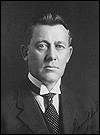| |||||||||||||||||||||||||||||||||||||||||||||||||
63 seats in the Legislative Assembly of Saskatchewan 32 seats needed for a majority | |||||||||||||||||||||||||||||||||||||||||||||||||
|---|---|---|---|---|---|---|---|---|---|---|---|---|---|---|---|---|---|---|---|---|---|---|---|---|---|---|---|---|---|---|---|---|---|---|---|---|---|---|---|---|---|---|---|---|---|---|---|---|---|
| |||||||||||||||||||||||||||||||||||||||||||||||||
| |||||||||||||||||||||||||||||||||||||||||||||||||
The 1929 Saskatchewan general election was held on June 6, 1929 to elect members of the Legislative Assembly of Saskatchewan.
Contents
- Results
- Percentages
- Members elected
- July 16, 1929
- August 12, 1929
- See also
- References
- Further reading
As a result of corruption scandals, the Liberal Party of Premier James Gardiner lost a significant share of its popular vote, but more important, lost twenty-two of the seats it had won in the 1925 election. While the Liberals held the largest number of seats in the legislature, they had only a minority. Gardiner tried to continue as a minority government, but was quickly defeated in a Motion of No Confidence, and resigned as premier.
The Conservative Party of James T.M. Anderson increased its representation in the legislature from three to twenty four seats. Following Gardiner's resignation, Anderson was able to form a coalition government with the support of the Progressive Party and some independents.
The Progressives had lost a large part of the popular vote it had won in 1925, but managed to retain five of the six seats it had won previously.

